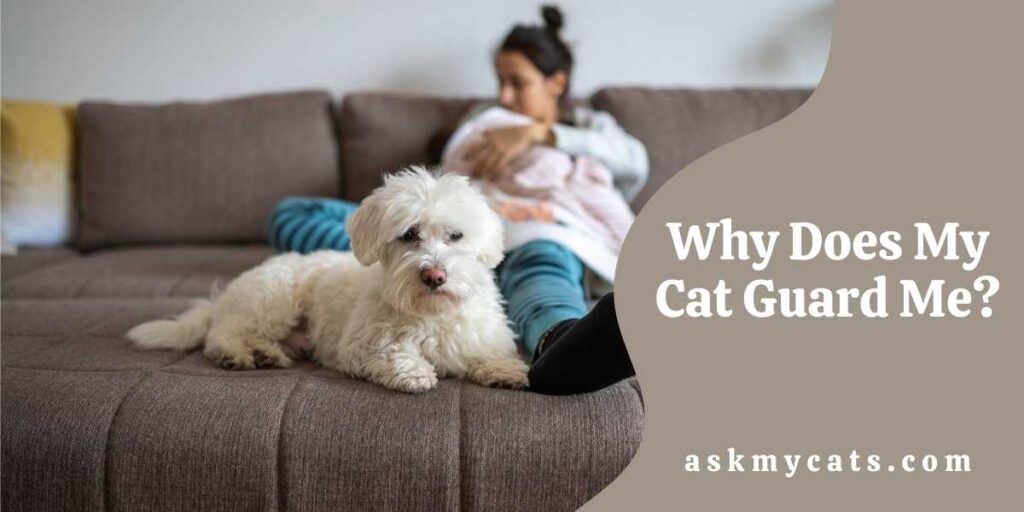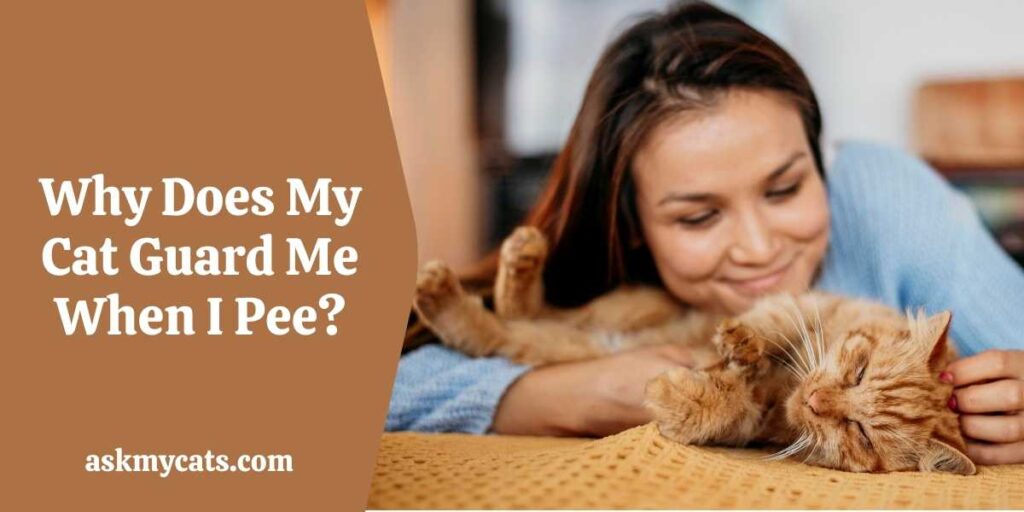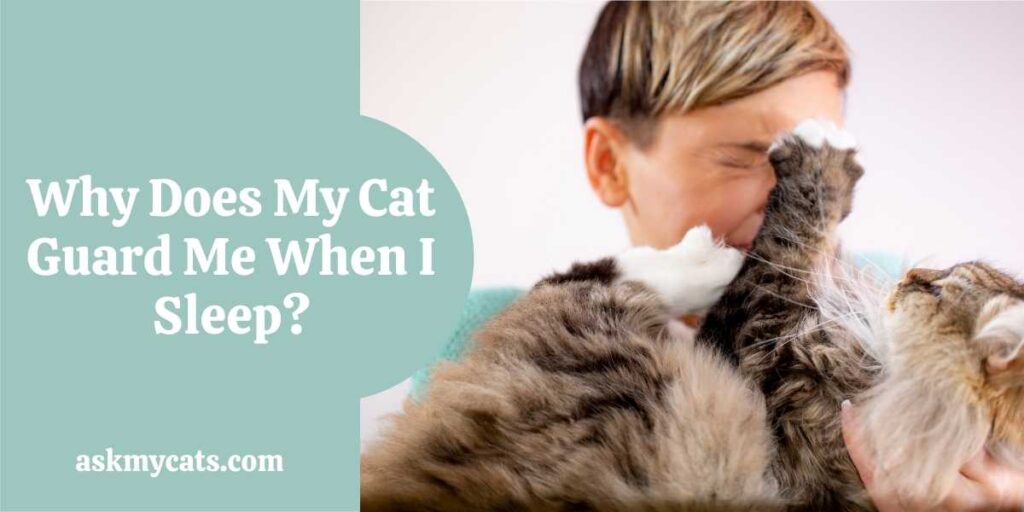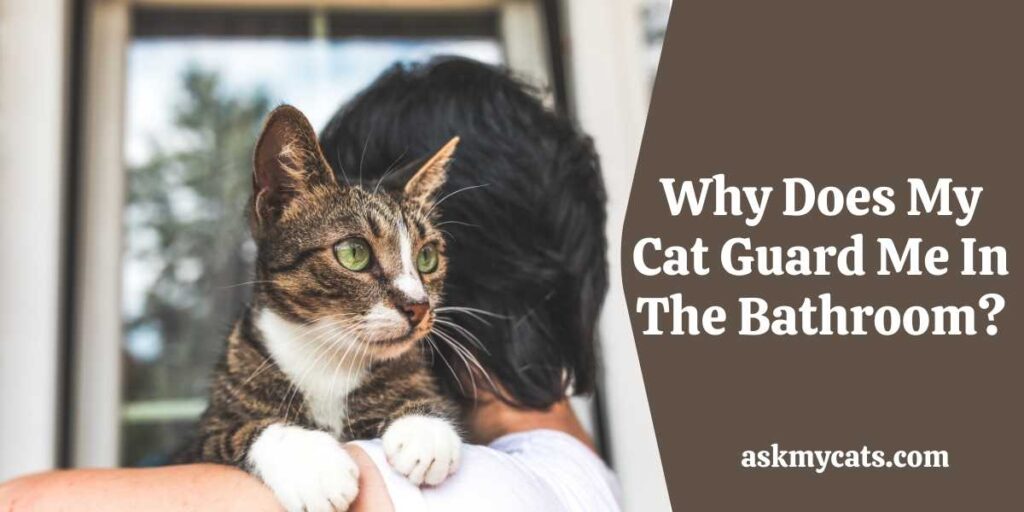While some may find it difficult to believe, a cat is more than capable of defending you. A cat may be almost as protective as a dog at times. On the other hand, a cat is reluctant to use physical hostility unless it is necessary.
Cats guard you to keep their domain safe. Separation anxiety causes cats to cling to you and protect you. Cats’ protective behavior is a show of devotion and is anticipated.
Cats and humans have had a profound affinity for thousands of years, dating back to 4400 B.C. If you have a close relationship with a cat, it will likely defend you. A cat’s devotion must be earned; thus, this isn’t a given.


Give Your Cat the Perfect Day
Get the Free Ebook!
Why Does My Cat Guard Me When I Pee?
Your cat guards you while you pee because of separation anxiety.

We usually close the door to a cat when we go to the restroom. This is significant since they are no longer able to see you. As a result, it’s not unusual to hear your cat wailing and poking its paws beneath the door in an attempt to find you.
Consider turning on the shower, handwashing, or flushing the toilet. All of those loud noises startle your cat, and they feel powerless and terrified while they’re on the other side of the door.
As a result, a cat will frequently accompany you into the bathroom and sit at your feet while you use the area. Some will even stand at the door to keep an eye on things.
Have you ever had a cat keep an eye on you while you were showering? It’s only a matter of time if you don’t! Although cats dislike water, they recognize that you are vulnerable in it and will keep an eye out for you as you clean.
It’s all instinct for your cat, and being close to you is necessary because they equate losing sight of you and hearing all of those noises in the toilet with the need for protection.
Why Does My Cat Guard Me When I Sleep?
Your cat guards you when you sleep because he wants to assure your safety at that time.

Humans form bonds with cats. According to research, they’ve discovered that cats build emotional bonds with their owners. When a cat feels calm, comfortable, and secure in the company of its human owner, this is referred to as “secure attachment.”
There are other advantages to a cat guarding its owner. They get a warm, safe home, regular food, a comfortable place to sleep, and affection when they want it in exchange for their company.
It’s easy to mistake your cat’s desire to be near you for their defending you. Your cat may experience separation anxiety if it follows you around the house, sits outside the bathroom door, or meows when you leave the room.
When your cat is apart from you for an extended time, it develops separation anxiety. It’s possible that it’s anxious and wants solace in your company.
If you have a rescue cat, it may have had a complicated past and now feels comfortable in your company. A variety of factors can cause separation anxiety.
Cats behave differently when a new baby is added to the household. Some cats will get envious of the newcomer, while others will flee. However, a cat may become protective of its baby companion in certain circumstances.
Cats are clever animals who have been known to raise the alarm when a baby becomes ill unexpectedly. There have even been instances of cats wrapping themselves around abandoned newborns’ fragile bodies to keep them warm in the cold.
Some felines have a strong mother instinct or communicate through noises. Because a baby’s scream sounds similar to a kitten’s distress cries, your cat may mistake them for one another. Its instincts may kick in, causing her to sit with the infant, lick it, or stay close by to protect it.
Allowing your cat to smell and softly touch your infant under tight supervision is an excellent approach to plant the seeds of friendship between your kid and cat by reassuring the latter that it has nothing to be afraid of.
Why Does My Cat Guard Me In The Bathroom?
Your cat guards you in the bathroom because he feels it’s his duty to protect you at that time. When cats pee, they are also afraid, and they assume you are as well, so they defend you, attempting to make you feel secure.

Cats are prey for other animals; thus, seclusion is essential. They are concerned about your safety when you are in the restroom.
As a result, it strives to make you feel at ease while you go about your regular business in the restroom.
Your cat is on high alert the entire time you’re in the bathroom and is thereby protecting you.
If your bathroom contains a tub, your cat could love exploring it and playing with toilet paper inside.
Inside the bathroom, robes, and clothing, as well as the wet bathroom, your cat is free to roll about on the floor.
Even if you are not in the bathroom, your cat may like to enter and play.
When you come inside and close the doors, including the bathroom door, your cat may become intrigued.
If it becomes a habit, your cat may become less interested with time; however, they may continue to remain outside the bathroom if not inside.
Closed doors irritate cats, and they become even more interested because cats are naturally curious animals.
They will seize this chance to be with you and want to be near you even if you are in the bathroom and if you are always out for work.
They’ll do everything they can to gain your attention. After getting a bath, many cats like licking their humans.
Your cat may enjoy the sink. Because the sink may be shaped like a cat bed, it might cradle the cat’s body.
Your cat’s heated body may feel extremely comfortable in the sink because the sink’s surface is very chilly to them.
It also wants to drink the water from the faucet. Your cat could like being near the water, but not in it. If the faucet is turned on, your cat can drink water while inside the bathroom.
It’s one of the things your cat will appreciate and feel secure doing when drinking water from the tap rather than the vessel.
Also, check out why does my cat wait outside my bedroom door
Why Do Cats Guard Doorways?
Your cat guards the entrance to your house as a means of defending you from harm. They do this to keep any potential prey away from you.
When a cat has a particular link with its people, it tries to keep you safe and comfortable as well. Cats have a reputation for being the least loving pets. They do, however, strive to express their affection through modest gestures.
Your cat stays outside your bedroom floor because it keeps them closer to you, giving them more opportunities to attract your attention, or because it’s the only precise location in the home where they can see everything.
Cats are intelligent creatures. They know how to capture your attention by utilizing their intellect or a cause.
Maybe you’ve given them a room or an area where the house’s activities aren’t visible, but cats despise that. Cats are intelligent creatures who require constant monitoring of their surroundings.
Your cat discovers that the only way to bridge this communication chasm is through your bedroom door. Yes, it is correct.
Frequently Asked Questions
Why is my cat so protective of me?
The most typical reason for this behavior is resource protection in the animal world. This is because cats are creatures of habit to maintain their well-being and avoid potentially risky or unpleasant circumstances. This pattern encompasses more than just when they eat or where they go in their surroundings.
Why does my cat stand guard by me?
Your cat guards the door to your bedroom as a means of guarding you against harm. They do this to keep any potential prey away from you. When a cat has a particular link with its people, it tries to keep you safe and comfortable as well. Cats have a reputation for being the least loving pets.
Would a cat defend its owner?
When other cats do not threaten cats, they will rub on them, sleep close to them, and remain in their presence to demonstrate affection. Your cat has imprinted on you if it repeats such actions with you. They are rubbing up against you.
Final Words
Cats guard their area and the people who provide them with love, care, food, and shelter. They accomplish this by following their owners around and removing anything that may endanger their loved ones.
Ask your questions in the comments section below.
